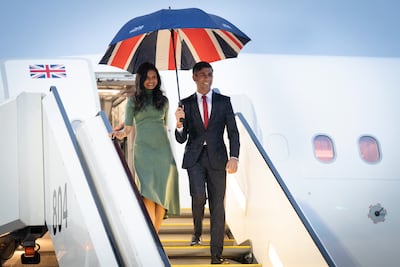Rishi Sunak made history as the UK's first British Asian Prime Minister but his future will be in the hands of British voters when they deliver their verdict at a July election.
Polls suggest Mr Sunak, 44, faces a huge uphill battle to keep his Conservative Party in power after years of political and economic turmoil in Britain.
With an image as a slick operator and safe pair of hands, Mr Sunak promised stability and a focus on bread-and-butter voter priorities after taking power in 2022.
In his 19 months in office he has staked his reputation on a pledges to lift Britain's economic mood, cut hospital waiting times and curb illegal immigration.
He called the election after making the greatest progress to date on any of those pledges when inflation fell to 2.3 per cent, its lowest level in three years.
In choosing July 4 – the earliest possible date for the election in the "second half of this year" he promised – he is gambling that better economic news will persuade voters to "stick to the plan".
He is also promising security at a time of rising extremism but his other pledges have yet to come off and he is weighed down by deep dissatisfaction with the Tories after 14 turbulent years in power.
Rishi Sunak through the years - in pictures
Family background
Born in England to a family of Indian descent, Mr Sunak is the UK's first Hindu and first British Asian leader – a landmark that won him cross-party congratulations.
At only 42, he also became Britain's youngest prime minister since Lord Liverpool in 1812.
Assuming power during Diwali in October 2022, he wore a garland of flowers to celebrate the Hindu festival of lights on his first full day in No 10 Downing Street.
While inspiring pride among some of Britain's ethnic minorities, Mr Sunak has also failed to shake off an image of wealth and privilege.
Educated in the prestigious classrooms of Winchester College and the University of Oxford, he and his wife Akshata Murty have an estimated $673 million (£528 million) fortune.
Ms Murty owns a stake in Infosys, a $64 billion Indian IT company co-founded by her billionaire father. The couple have two daughters.

A former investment banker with a fascination for tech and AI, Mr Sunak entered politics in 2015 when he was elected Conservative MP for Richmond, Yorkshire.
A supporter of Brexit, his rise in party ranks was rapid and he was a cabinet minister by 2019, when Boris Johnson made him a minister in the Treasury.
He became chancellor of the exchequer in February 2020 in a role that would massively raise his profile during the Covid-19 pandemic.
His £410 billion spending spree kept millions of people afloat during the dark days of lockdown and job furloughs.
While known for a media-savvy social media presence, he did not emerged unscathed from Covid-era scandal as he was fined over an illegal Downing Street birthday party.
The drumbeat of scandal would ultimately bring down the Johnson government, which collapsed after Mr Sunak resigned in July 2022.

Defeat and comeback
Mr Sunak lost the subsequent Conservative leadership election to right-wing rival Liz Truss, but he was given a second chance when her gung-ho economic agenda collapsed within 49 days.
Tory MPs desperate for stability rallied around Mr Sunak and he was crowned leader without a vote being cast – even though some never forgave him for his role in Mr Johnson's downfall.
After being appointed by King Charles III he stood on the steps of No 10 Downing Street promising to restore "stability and confidence".
There were early signs of the stability he promised as financial markets calmed and post-Brexit differences were patched up with France and the EU.
In January 2023 he made his five pledges to halve inflation, grow the economy, cut national debt, reduce hospital waiting lists and stop illegal immigration over the English Channel.
His campaign to "stop the boats" has been beset by delays although he finally claimed a win last month when a first illegal migrant voluntarily left for Rwanda under a controversial scheme.
Rishi Sunak's childhood landmarks - in pictures
The waiting lists drive was hit by a pay dispute with doctors while the economy has slipped back into recession, foiling another pledge.
Last year he angered climate campaigners by watering down some of Britain's net-zero pledges, saying he was putting the UK on a more realistic path.
Amid wars in the Middle East and Ukraine he has recently put a focus on security and promised to raise the UK's defence spending.
The sometimes ugly fallout from the Israel-Gaza war has also prompted an anti-extremism drive to tackle what Mr Sunak called a "poison" in British society.
While he has presided over an uneasy calm in relentless Tory warfare, an undercurrent of scandal has continued to plague the party under Mr Sunak's leadership.
An election win on July 4 would be one of Britain's biggest political upsets and require political skill that many feel Mr Sunak has lacked to date.




















































